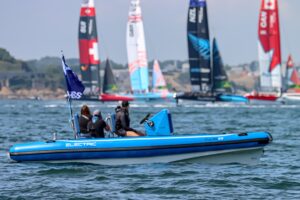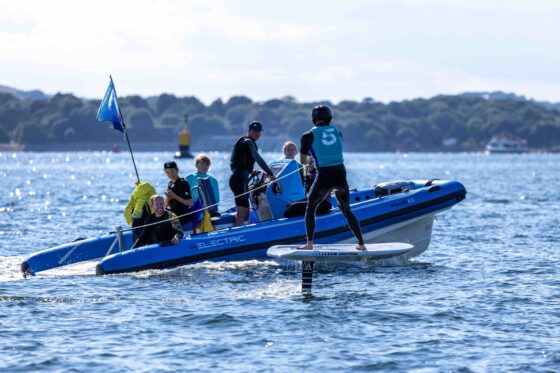
RS Electric’s Pulse 63 proves its credentials with SailGP

In what is expected to be the first of many joint programmes, RS Electric says that its Pulse 63 performed excellently at the European legs of the SailGP worldwide sailing championship.
As part of its sustainability initiatives, SailGP charters electric RIBs into operational roles where it can. Pulse 63s were used in Plymouth, St Tropez and Cadiz for a combination of purposes.
“We used the RS Pulse in a variety of roles,” says Tom Verity who looks after the sustainability division of SailGP. “As a media boat for photographers, as a course marshal patrolling the perimeter helping to keep the event’s integrity and boundaries, and as a coach boat for the SailGP Inspire programme (used for both coaching and tow foiling) where it really excelled. Its efficiency at low speed is really impressive, going a full day on one charge.”
Verity cites three particular aspects as making the Pulse “overall extremely impressive”. Firstly, he says, it has a very good energy consumption at low speed. Secondly, it’s really manoeuvrable with a tight turning circle and excellent handling, and thirdly the deck space at the rear is unparalleled (it’s a stern drive rather than an outboard). He says that charging was easy to integrate into the days on the water.
Aside from its range and handling capabilities, the RS team was particularly pleased with the Pulse’s charging which took place seamlessly – and speedily.
“We were able to access a fast charger in Plymouth and I was amazed at how quickly the boat charged; within an hour we nearly got a majority charge while waiting for lunch,” says Thomas Herbert-Evans, youth program manager (SailGP Inspire), who drove the Pulse in Plymouth.
The Pulses were supported by built-in electrical charging infrastructure in Plymouth, courtesy of Aqua superPower. Plymouth switched on a series of Aqua superPower’s high-power DC electric charging stations earlier in 2022, creating the UK’s first e-marine hub of shore-side charging facilities for electric boats. The company also provided temporary power points in Cadiz.
 Image courtesy of Ricardo Pinto for SailGP
Image courtesy of Ricardo Pinto for SailGPThat the Pulse 63 has been recognised as a leader in its field is testament to the design and development which has gone into the electric boat.
Jon Partridge, CEO for RS’ marine group of businesses, says he’s delighted the Pulse was selected to be part of an international platform which is dedicated to promoting sustainable alternatives and a cleaner future.
“It was truly wonderful to see electric boats out there as part of the events,” he says. “The Pulse earned its place in the flotilla by not only being clean, but also by its rugged design, practical nature and innovative credentials. But we won’t rest on what we’ve created so far, we are constantly developing and tweaking the design to make sure it’s the best that it can be. Now that it’s been fully tested in these environments we know what it can achieve and what the next steps are to grow its capabilities.”
Herbert-Evans says he was also impressed with the Pulses’ battery power.
“We went out in St Tropez and used something like nine per cent of the battery power after a long time afloat doing under 8 knots (stopping/starting),” he says.
“The first thing that struck me was the silence of the Pulse and just how clean it is. I really like the level platform which enables you to get a lot of boats around you at once. The platform itself is incredibly stable with the cathedral hull design and suitable for carrying several passengers safely.
“After many years of driving RIBs I think it’s fantastic, especially with the price of fuel at the moment. A RIB of this size could easily use £100 in fuel per day. . . [this] is changing the future of powerboating and offering the best green solution on the market.
“It goes without saying that having a non-polluting option on the water is a must.”
“The hiring and electric-charging model allowed us to take fossil fuels out of the fleet,” says Verity. “We will charter locally where we can. In the near term we will be looking to bring a more sustainable solution to the events – but even transporting Pulses to the other European legs bring awareness of the roles in which petrol has diminished.”
A rugged spacious design for the Pulse was a must for RS Electric who initially wanted to create a commercial electric boat specifically designed for law enforcement, border protection, security, and marinas. It will also be available in leisure and superyacht configurations for private boat owners who want to reduce their carbon footprint.
 Image courtesy of Felix Diemer for SailGP
Image courtesy of Felix Diemer for SailGP